ARTICLE AD BOX

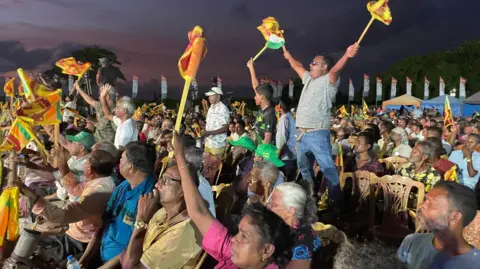 BBC News/Aakriti Thapar
BBC News/Aakriti Thapar
A rally for Ranil Wickremesinghe in the coastal town of Beruwala - he's the man to beat but lacks his own big political base
“I thought I’d spend my whole life here, fighting a corrupt government - but the younger generation did something.”
Samadhi Paramitha Brahmananayake is looking at the field where she spent months camped out with thousands of other demonstrators in Sri Lanka’s capital in 2022.
She can’t quite believe that luscious green grass has replaced the hundreds of protester tents that filled the field opposite the presidential secretariat.
“I feel we’re now more energetic, more powerful,” says Ms Brahmananayake, a 33-year-old banker based in Colombo.

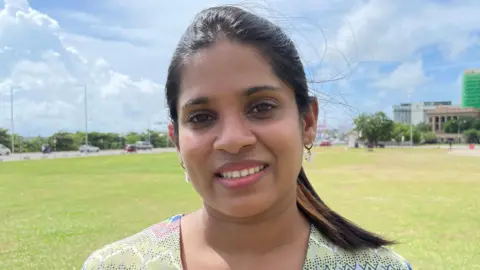 BBC News/Aakriti Thapar
BBC News/Aakriti Thapar
Samadhi Paramitha Brahmananayake, standing in the former tent field, feels people have power in their hands now
Two years ago, huge crowds forced the country’s deeply unpopular leader from office – now voters are just days away from choosing who they want for president.
It’s the first election since the mass protests - called the “aragalaya”, Sinhalese for struggle – which were sparked by Sri Lanka’s worst economic crisis. Inflation was at 70%. Basics like food, cooking gas and medicine were scarce.
Gotabaya Rajapaksa, the president at the time, and his government were blamed for the mess. He fled the country just before crowds stormed his residence. Euphoric protesters leapt into the presidential pool, taking victory laps.
Sri Lanka crisis: Protesters swim in president's pool
Mithun Jayawardana, 28, was one of those swimmers. “It was awesome,” he said thinking back. Jobless, with no gas or electricity at home, he says he joined the aragalaya for a lark.
Today, he recognises how crucial the elections on Saturday are: “We need a president who is elected by the people. The people didn’t elect the current president.”
Ranil Wickremesinghe, the man who currently holds the job, was appointed to the position after Gotabaya Rajapaksa resigned. Mr Wickremesinghe, who’s been tasked with steering Sri Lanka through a period of painful economic reform, is running for re-election as an independent.
He's stood for president twice before but never succeeded, and his political future appears uncertain.

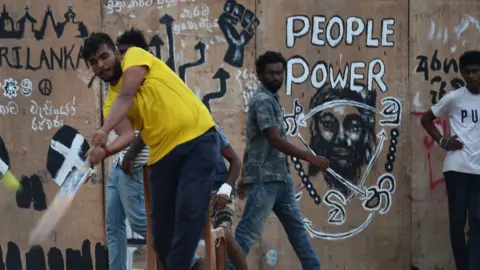 Getty Images
Getty Images
Demonstrators ran the protest camp for months - eating, sleeping and playing - until the government fell
Many associate Wickremesinghe with the Rajapaksas, a political dynasty who have dominated Sri Lankan politics for decades. Many blame them for the years of financial mismanagement that led to Sri Lanka’s economic woes.
Even the country’s top court ruled that Gotabaya Rajapaksa and his brother Mahinda, another former president, were among 13 former leaders responsible for the financial crisis.
Despite the political baggage that comes with the name, a Rajapaksa has entered the political fray in these elections - there are still places the family enjoys a lot of support.
One such district is just over an hour outside Colombo. Music, fireworks and the cheers of supporters greeted Namal Rajapaksa as he approached the podium to address the hundreds that had come to hear him speak on Monday in the town of Minuwangoda. Even his father, Mahinda joined him on stage.
Namal Rajapaksa denied his family’s role in Sri Lanka’s economic collapse.
“We know our hands are clean, we know we have not done anything wrong to the people or this country,” he told the BBC.
“We are willing to face the people, let the public decide what they want and who to vote for.”

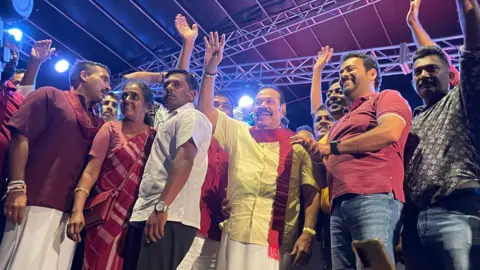 BBC News/Aakriti Thapar
BBC News/Aakriti Thapar
Namal Rajapaksa (far left) and his father (centre) at a rally near Colombo - they reject the accusations against the family
In all, a record 38 candidates are contesting the 21 September election, none of them women. In 2019, Sajid Premadasa, leader of the country's main opposition party, won 42% of the popular vote, losing to Gotabaya Rajapaksa. This time around he is thought to be in with a chance too.
For people looking for change, many are looking to Anura Kumara Dissanayake. The candidate of the leftist National People’s Party alliance has emerged as an unlikely frontrunner.
Thousands of people flocked to a field in the small town of Mirigama, two hours north-west from Colombo, to hear Mr Dissanayake speak last Saturday, many wearing bright pink hats or T-shirts with his face.
“Yes 100% sure, okay,” he tells the BBC, when asked if he can win. Campaigning as the voice of the working class, he is hoping to disrupt Sri Lanka’s political establishment.

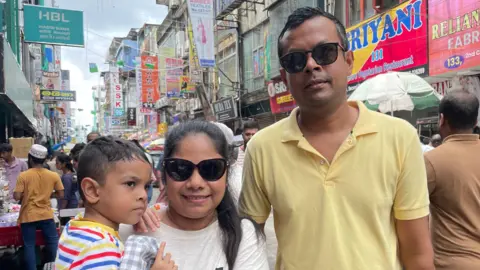 BBC News/Aakriti Thapar
BBC News/Aakriti Thapar
"Taxes are so high, we can’t manage," says Rangika
Unlike past elections in Sri Lanka, the economy is front and centre in this one.
Holding her four-year-old son Nehan, Rangika Munasinghe laments the higher taxes she now pays.
“It’s very difficult. Salaries are being reduced, taxes on products and food are high. Kids meals, milk powder, all more expensive. Taxes are so high, we can’t manage it,” the 35-year-old told the BBC at a busy market in Colombo.
Sri Lanka was able to stave off bankruptcy in 2022 thanks to loans from the International Monetary Fund, and countries like China and India. But now everyone is feeling the pressure from the country’s enormous $92bn (£69bn) debt burden, which includes both foreign and national debt.
“I’m doing two jobs,” says Mohamed Rajabdeen, who’s in his 70s. He is selling spoons from a stall off a busy street. Once this is done, he will travel to his second job, working in security.
“We should get good salaries, university students should get jobs, and people should be able to live in peace and harmony. We expect our government to fulfil all of that.”

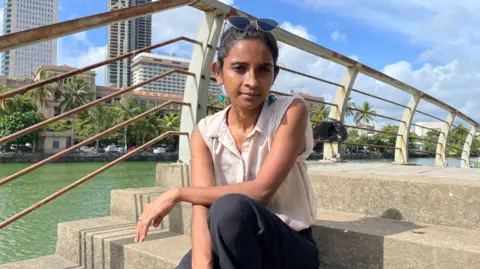 BBC News/Aakriti Thapar
BBC News/Aakriti Thapar
Activist Melani Gunathilaka says there has been a big change in society
Being that vocal about their expectations from elected officials is something new for many people in Sri Lanka. That change has been brought about by the protest movement, says Buwanaka Perera, a youth political activist.
“People are more gutsy in confronting the state or in confronting what’s wrong,” the 28-year-old said. “It’s not just the state, it’s trickled down to everyday things - it can be in your household, it can be in your streets. To make a stand to voice out and to look out for one another.”
Ms Brahmananayake agrees, calling it a lasting impact of her efforts and the thousands of others who participated in the uprising two years ago.
“People are talking about politics now. They are asking questions. I think people have the power in their hands. They can vote.”
Like her, climate and political activist Melani Gunathilaka, 37, knows the path forward will not be easy for Sri Lanka, but they have hope.
“There hasn’t been a change in the political and economic culture - but there has been a massive change in terms of society,” she says.
“For the first time people took charge, people exercised their democratic rights to do what’s right for the country.”
Who are the candidates?
Ranil Wickremesinghe, a six-time former prime minister, was appointed president after Gotabaya Rajapaksa was ousted in 2022.
The 75-year-old, who faced the monumental task of trying to lead Sri Lanka out of economic collapse, has been accused of protecting the Rajapaksa family, allowing them to regroup, while shielding them from prosecution - allegations he has denied.
Anura Kumara Dissanayake is the candidate of the leftist National People’s Party alliance.
His promises of tough anti-corruption measures and good governance have boosted his candidacy, positioning the 55-year-old as a serious contender.
Sajith Premadasa, the runner-up last time, is the leader of the country's main opposition Samagi Jana Balawegaya (SJB).
Earlier this week, he told news agency AP that he would ensure that the rich would pay more taxes and the poor would see their conditions improve if he won.
Namal Rajapaksa comes from a powerful political clan that produced two presidents.
The 38-year-old's campaign has centred around the legacy of his father, who is still seen as a hero by some Sri Lankans for presiding over the bloody end to the civil war against Tamil Tiger rebels. But he needs to win over voters who blame the Rajapaksas for the economic crisis.

 2 months ago
16
2 months ago
16
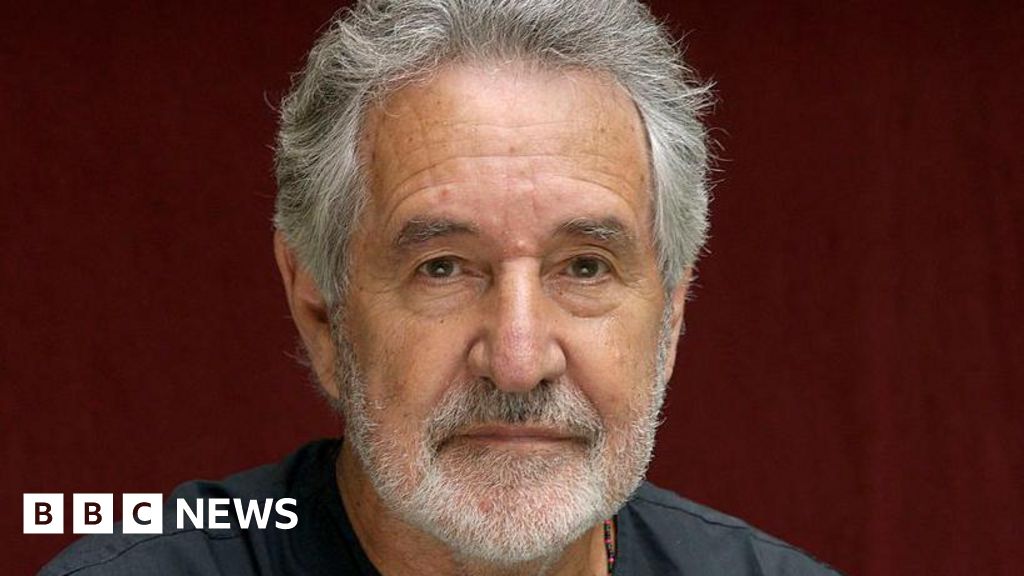
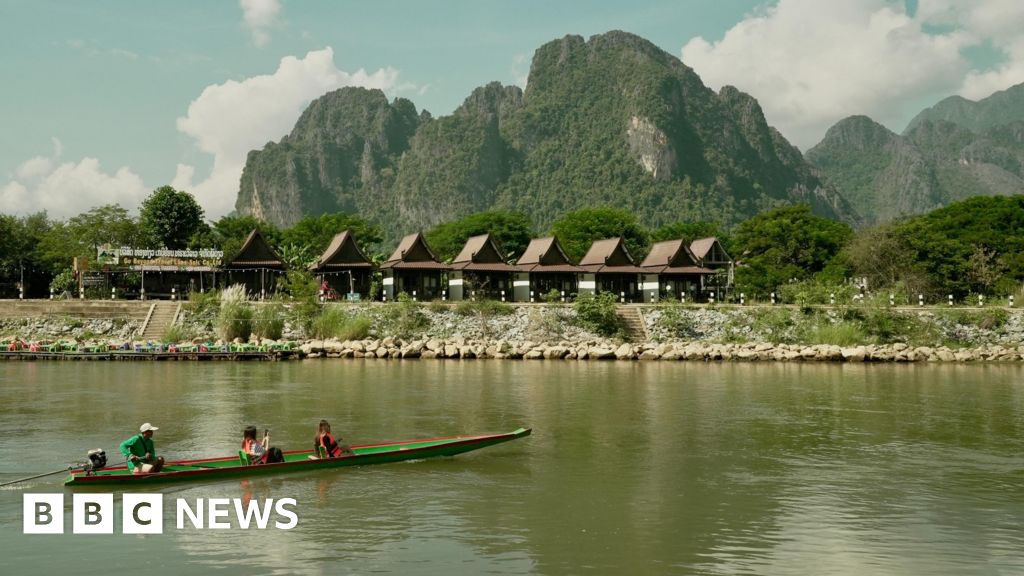
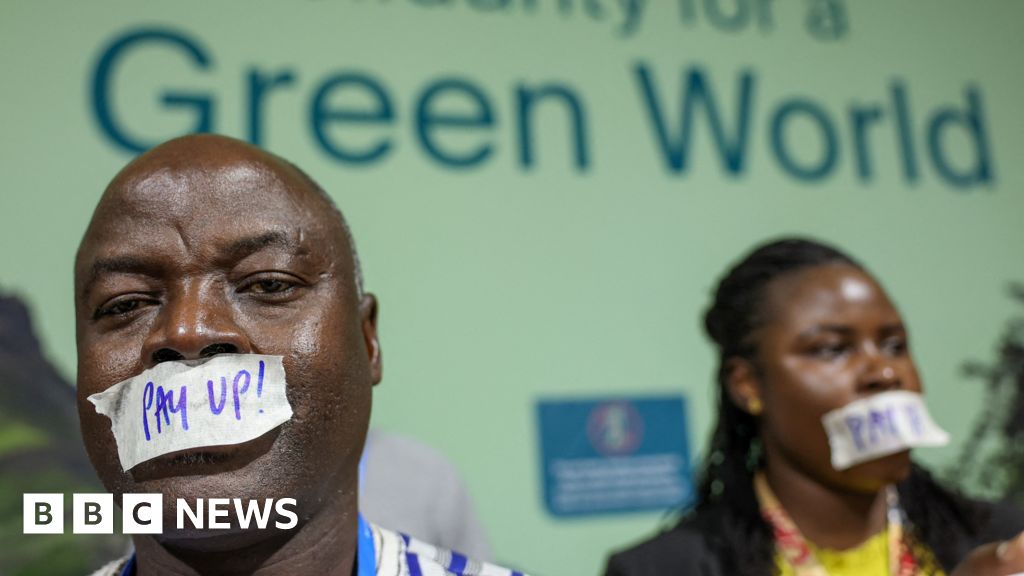





 English (US)
English (US)